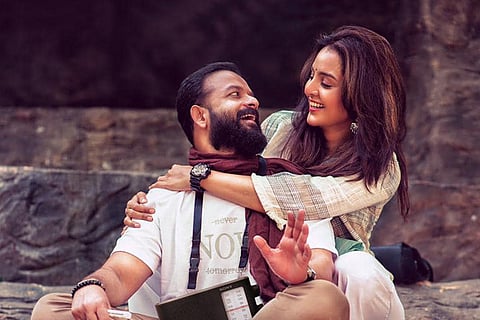

On the surface, Jayasurya looks unremarkable, wearing a trimmed beard with cropped hair and regular clothes, the way he appears in interviews. Once you go into the film though, he looks and sounds unfamiliar. There is none of the casual humour he is known for, only a few scattered laughs. In Meri Awas Suno, he is a serious man balancing work and life, believing his voice to be his identity with a job in the radio, a difficult man in the face of calamity, a very regular human being. The film – the latest by director Prajesh Sen – has a bundle of problems, but you can’t go into it without appreciating Jayasurya who has grown into an actor who can seamlessly turn into unexpected personas on screen.
Meri Awas Suno had generated interest, primarily because Manju Warrier and Jayasurya were acting together for the first time. Their lives in the film – one working as a speech therapist and the other as a radio jockey – run parallel until a point. The titles of Meri Awaas Suno open with a trip through radio history, playing important announcements of decades, of a time when people knew what went around only through the voices of announcers. It ends with the radio stations of today, playing 24-hour programmes, RJs talking on air nonstop. RJ Shankar (Jayasurya) is one among them, taking calls from people going through a crisis, sharing his philosophies with them, and offering them music to relax with.
Baring the fascinating voice he is identified with, Shankar has a pretty regular life, enjoying his work and time with the family – Meryl (Sshivada) and a little son. Theirs seems to be an intercaste marriage left uncommented upon, except for a few markers like Shankar’s tilak on the forehead. It is a happy marriage, though the pressures of work leave little time for the family. The only oddity about Shankar is his chain smoking. There is hardly a moment in which he is seen without a cigarette dangling from the corner of his mouth.
Watch: Trailer of the film
Crisis befalls at a time when everything seems to run smoothly, just as Shankar steps on to the stage to receive a Voice of the Year award. It damages the family’s peace and shatters Shankar so badly that he turns aloof, unable to connect to the wife he held so close. Sshivada is wonderful as Meryl, her joys, sorrows and frustrations coming through so quietly and convincingly, you easily step into her shoes and worry for her. Jayasurya turns into the difficult man with his characteristic ease, conveying his misery through close-up shots of his face.
Manju Warrier makes a reentry at this point as the loud and unpredictable Dr Reshmi, meeting Shankar officially. Her character is written to be eccentric, with little concern for social norms. It would seem that the unreal loud laughs, impertinent behaviour, and unusual methods of treatment that border on problematic are supposed to make the doctor different, unique, and perhaps likeable. But this portrayal ends up as an annoying schtick, with the doctor appearing as someone with little consideration for others, shouting down orders and using questionable methods of treatment. All that Dr Reshmi devises appear unhealthy for the mind of a patient who is ready to slip into depression any moment, with her explanation of the ‘need block theory’ sounding like a half-baked experiment and her demeanour rather intimidating. Prajesh Sen, while writing the character of Dr Reshmi, does not appear to have given it the thought he put into Shankar’s character.
The film’s tendency to excessively dramatise moments begins in the intro, when an ambulance is rushing through the road and a patient inside is spitting blood, the music high on tension. The reliance on these tools, exaggerated and unimaginative, reduces the emotional moments to look staged, despite flawless performances by most of the actors. The sequence involving a little girl in a dangerous situation also looks so operatic that it fails to evoke empathy.
However, the film has a very interesting premise, and can give way to multiple thoughts – about the things you take for granted, the time you don’t give to people that matter, and how you will react in the face of a crisis. The loud and sometimes problematic treatment, however, significantly lessens its effect.
Disclaimer: This review was not paid for or commissioned by anyone associated with the series/film. TNM Editorial is independent of any business relationship the organisation may have with producers or any other members of its cast or crew.